Popular games for franchise Ultima

Ultima Online is the product of Richard Garriott's idea for a fantasy game involving several thousand people who can all play in a shared fantasy world. It is responsible for grandfathering the genre of the MMO, and showing the industry that MMO's were the next era of gaming.
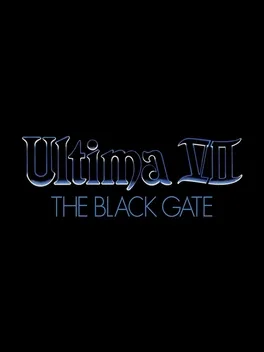
It has been two centuries since the Avatar last appeared in our good kingdom. Some have written that at last it is possible to interpret the tales of the Avatar as they should be, with the proper historical perspective. Some argue that as time moves on, the truth of what actually occurred will fade even further away and that we have a responsibility to preserve the legends as we now know them. However, most agree when it comes to a number of basic theories. While there are those who maintain that the stories of the Avatar are only myths, practically all credible scholars say that at least some elements of the Avatar’s tales are historical fact. In reality, one need look no further than the Isle of the Avatar to see very persuasive evidence that the Avatar did indeed exist - at least as a person if not as a spiritual being! It is most likely that there has been more than one Avatar. All of the writings insist that the Avatar who negotiated the peace between Britannia and the gargoyles is the one and same person who first appeared to vanquish the sorcerer Mondain those many years ago. While saying it is most unlikely, historians do not firmly deny the possibility of there having been only on Avatar. After all, our good sovereign monarch, wise Lord British, has himself displayed an amazing longevity! Whatever interpretation of history proves to be most accurate, it seems undeniable that the Avatar will not return to our fair kingdom. By all indications the age of magic is coming to an end. With the decline on reliability of mages, and with the kingdom turning away from the magical arts, it is doubtful that extreme danger - that which would require an Avatar’s aid to defeat it - will ever return to Britannia. And thankfully so. Upon us is the age of The Fellowship, in which one does not simply wait in anticipation for a heroic savior when a crisis occurs. In this less spectacular but more practical day, we are left to solve our problems with our own minds and our own will.
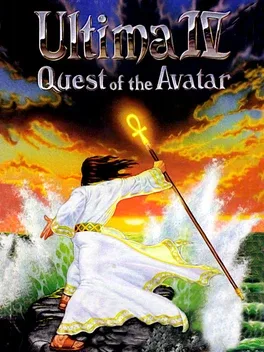
Following the defeat of the evil triad in the previous three Ultima games, the world of Sosaria changed beyond recognition: continents rose and sank, and new cities were built, heralding the advent of a different civilization. Unified by the reign of the benevolent monarch Lord British, the new world was renamed Britannia. Lord British wished to base people's well-being on the ethical principles of Truth, Love, and Courage, proclaiming the Eight Virtues (Honesty, Compassion, Valor, Justice, Sacrifice, Honor, Spirituality, and Humility) as the ideal everyone should strive for. The person who could accomplish full understanding and realization of these virtues would serve as a spiritual leader and a moral example for the inhabitants of Britannia; he alone would be able to obtain holy artifacts, descend into the Stygian Abyss, and access the Codex of Ultimate Wisdom. This person is the Avatar. The fourth game in the Ultima series features an improved game engine, with color graphics and enhanced character interaction: the player can have conversations with non-playable characters by typing names of various topics. However, the main difference between Ultima IV and its predecessors in the series (as well as other role-playing games) lies in the game's objectives and the ways to fulfill them. Instead of building up a character by any means possible in order to face a villain in the end of the game, in Ultima IV the player is trying to become the Avatar, a role model for people. This means upholding the Eight Virtues, basically trying to become a better person. Making morally conscious decisions and helping other people is not done expecting a material reward, but because it is the actual goal of the game and the main focus of its gameplay. The game frowns on behavior typical of most other RPGs, such as backstabbing fleeing enemies or picking up everything that isn't nailed down even if it does not belong to the protagonist. This different approach established the game's reputation as the first "true" Ultima, influencing the design philosophy of later installments and the overall spirit of the series. Character creation is done by choosing responses to morally ambiguous questions. Each of the Eight Virtues corresponds to a character class; by determining the player's personal priorities in the virtues, the game assigns a class and a starting location for the Avatar. After emerging in Britannia, the player is free to explore it in various ways (on foot, moongate teleportation, on horseback, by ship, etc.). Certain items must be collected in any order to enter the Stygian Abyss and complete the game. The Avatar also has to reach the highest level in all virtues. This is achieved by various means: donating blood increases Sacrifice, not fleeing from combat increases Valor, etc. The process, however, is not irreversible: should the Avatar overpay a blind seller, he gains Compassion points; should he, on the other hand, cheat the seller by underpaying, his level in several virtues would decrease. These unorthodox features of the game co-exist with plenty of traditional RPG elements, such as dungeons to explore and hostile monsters to kill. Enemies are encountered on the world map as well as in dungeons; combat takes place on separate top-down screens, allowing player-controlled and enemy parties freely move on them. Characters accumulate experience points and level up, gaining higher amount of hit points and access to stronger magic spells. Like in the previous installments of the series, world map, town exploration and combat are presented from a top-down view, while the dungeons are pseudo-3D and are explored from first-person perspective. Ultima IV also introduces several new gameplay features to the series and role-playing games in general. A number of initially non-playable characters living in various areas of the game world are able to to join the party and fight alongside the hero, replacing traditional player-generated characters or mercenaries and adventurers available only in special locations. Additional new elements include buying and combining reagents in order to cast spells, puzzle rooms in dungeons, and others. The FM Towns version, while identical to the others in gameplay, introduces upgraded graphics similar to those used in next installment of the series.
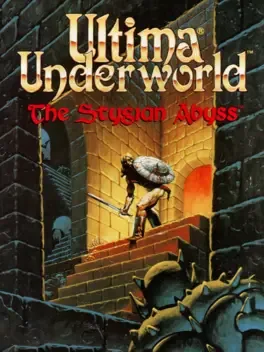
The Isle of the Avatar was discovered during the Fourth Age (as related in Quest of the Avatar), at the climax of the Avatar’s quest. The Stranger from Another World, who came to Britannia in answer to Lord British’s summons, completed the Test of the Eight Virtues and became the Avatar — the embodiment of the pure axiom of life. It was during his journeys that the Avatar unearthed a chilling artifact: the skull of Mondain the Wicked, the first of the Triad of Evil. There were those who claimed that the artifact held the power to destroy all life on our world. Fortunately, it was the Stranger who discovered it, and not someone of lesser Virtue. Upon completing the Path of the Eight Virtues, the Avatar embarked on a search for the Codex of Ultimate Wisdom. Legend linked this ancient tome with the subterranean maze known as the Great Stygian Abyss. “Truly, no one has ever plumbed its depths,” wrote Shamino, who arranged by magic to obtain a map of its corridors. “I cannot imagine the horrors that await the first to venture into the Stygian depths.”
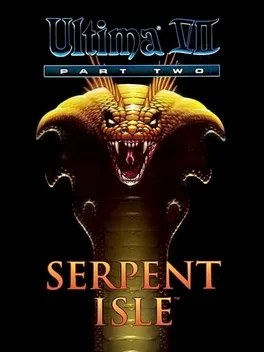
This game takes place 18 months after The Black Gate. Batlin, the leader of the Fellowship has disappeared, as well as Iolo's wife Gwenno. A map is found that points to the Serpent Isle where the Guardian is still planning to destroy Britannia. Lord British sends you, the Avatar, and your companions to this new land. Once there, you discover that a great imbalance is upon the isle and it is up to you to fix it. To do so, you must learn the philosophies of the original inhabitants of this land who worshipped giant serpents symbolizing the principles of Order, Chaos and Balance.
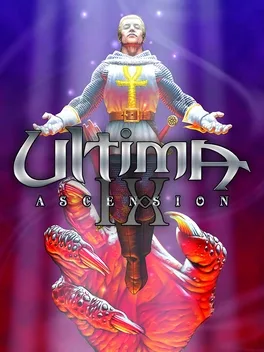
Prepare to embark on an adventure beyond imagination with the return of the best selling role-playing series of all time. In the 9th and final chapter in the 20-year legacy you return to Britannia for your last epic quest. As the heroic Avatar, only you can save Lord British and his people from the evil Guardian who has devastated the landscape and tainted the 8 sacred virtues. Valiant combat, magical prowess and knowledge of the 8 virtues are your weapons against evil in Ultima IX: Ascension, the most epic role-playing game ever created for the PC.
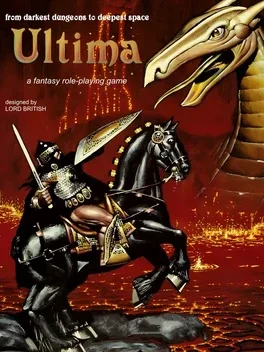
Ultima (later titled, Ultima: The First Age of Darkness) is the first game in the Ultima series of role-playing video games created by Richard Garriott. The game was one of the first definitive commercial computer RPGs, and is considered an important and influential turning point for the development of the genre throughout years to come.
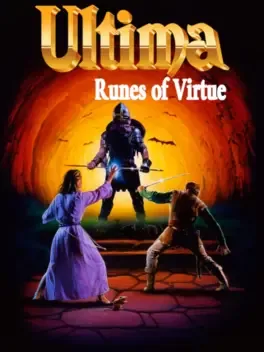
Ultima: Runes of Virtue is a Role-Playing game, developed by Origin and published by Pony Canyon, which was released in 1992.
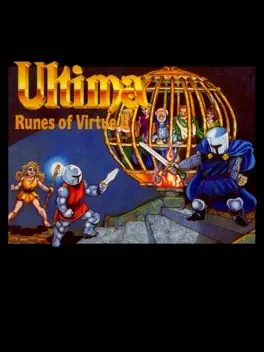
Runes Of Virtue 2 is the sequel to Runes Of Virtue for the Game Boy. Released on the Super Nintendo Entertainment System as well as the Game Boy, Runes Of Virtue 2 maintains the action-RPG gameplay as the original. In this game, the Black Knight kidnaps Lord Tholden, simply out of boredom. Lord British sends you, the Avatar, out to recover Tholden and return peace to Brittania. As in the first Runes Of Virtue game you have the choice of selecting one of four characters. And again, there are three modes of difficulty.
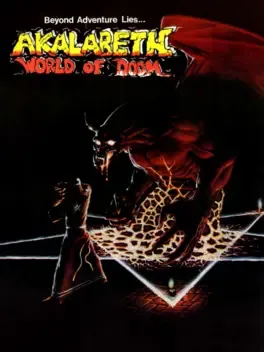
In the game, the player character visits Lord British and is instructed by him to kill certain monsters. The final mission is to kill a balrog, and after this has been accomplished, Lord British proclaims that "thou hast proven thyself worthy of knighthood".
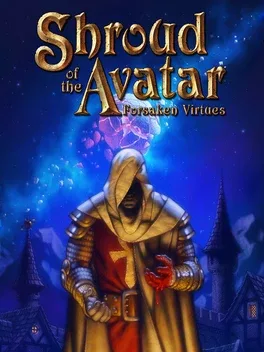
Journey to the world of Shroud of the Avatar: Forsaken Virtues, a computer role playing game created by Lord British (aka Richard Garriott), creator of the genre defining Ultima series of computer games, Starr Long, director of Ultima Online, and Tracy Hickman, author of the Dragonlance series. It combines rich story, like those of the single player Ultimas, with deep and varied multiplayer experiences, like Ultima Online.
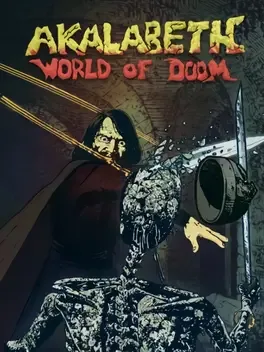
Enhanced port included in the Ultima Collection and later released for free on Gog.com.


Remastered version of Ultima I, release exclusively in Japan on the Ultima Trilogy: I + II + III collection for the FM Towns computer
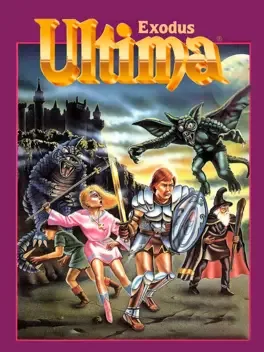
Ultima: Exodus is the first release for the Nintendo Entertainment System of the popular series. Don't expect to able to follow the storylines from the original computer series; this version is completely different and is meant as a stand alone game. At the beginning of the game, you can form your party either from a computer generated randomization or make your own characters if you have the time and talent to do so (there are a TON of different options for characters). The evil Exodus has risen from the seas to make his new home on a fiery island near Britannia Kingdom. Lord British sends out a plea for the best and greatest warriors known to man to join your group as you set out to defeat this monster. So gather ye weapons and magic spells and take on evils unknown is Ultima: Exodus.

The PlayStation port of Ultima Underworld I, released exclusively in Japan, features a number of enhancements and changes from the original, including new 3D polygonal graphics, a new controls and tweaked game play optimized for the console, remixed soundtrack and new video intro.
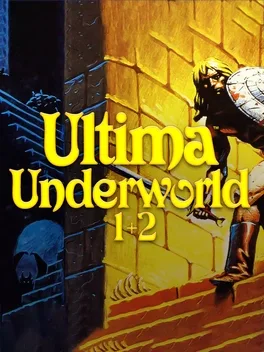
This bundle includes Ultima Underworld: The Stygian Abyss and Ultima Underworld II: Labyrinth of Worlds.
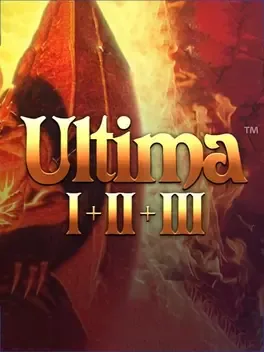
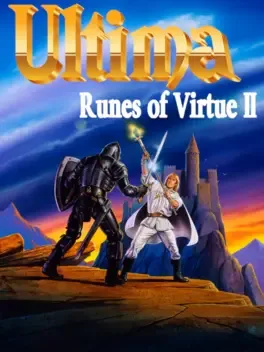
Ultima: Runes of Virtue II is the sequel to Runes of Virtue. It maintains the action-RPG gameplay of the original. In this game, the Black Knight kidnaps Lord Tholden, simply out of boredom. Lord British sends you, the Avatar, out to recover Tholden and return peace to Britannia.
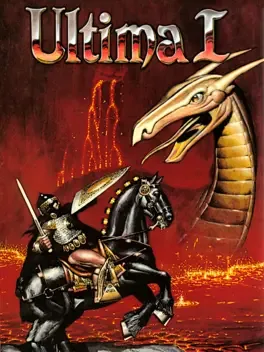
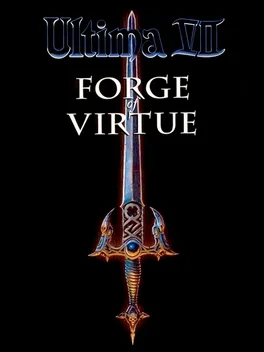
Ultima VII: The Forge of Virtue is an expansion pack for Ultima VII: the Black Gate.
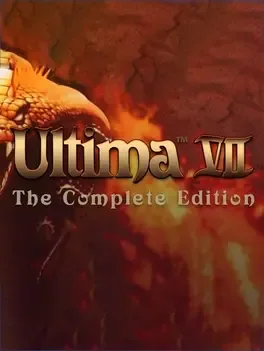
A collection of Ultima VII that includes both games and both expansions.
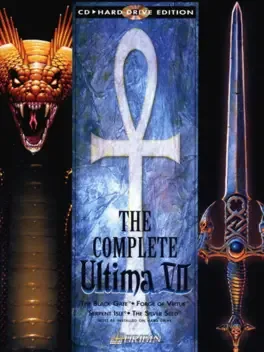
The Complete Ultima VII is a compilation of both parts of Ultima VII with both expansion packs.
